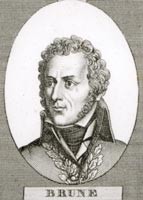Fact file
Born Brive-la-Gaillarde, 13 May 1763, murdered Avignon, 2 August, 1815
Married Angélique Nicole Pierre, 29 Nivôse, An IV (18 February, 1796)
Garde Nationale in Paris
2nd Bataillon de voluntaires de Seine-et-Oise 1791
Adjudant général
Chef de Brigade at headquarters under Dumouriez
Chef de Brigade of the Armée du Nord 1792
Victor over Wimpfen at Pacy-sur-Eure 1793
Commander of the town of Bordeaux
Supported Barras and Bonaparte (as a staunch republican) in opposition to the 13 Vendémiaire uprising, An IV (5 October 1795)
Served in Italy at Arcole and Rivoli
Appointed Général de Division by Bonaparte, 1797
Commanded the armies of Helvetia and subsequently Italy in place of Berthier, 1798
Replaced Hatry as commander of French forces, 1798
Victory over the Anglo-Russian forces at Bergen, 17 September, 1799
After Brumaire, took a seat on the Conseil d'Etat
Appointed head of the Armée de l'Ouest, January 1800
General in Chief of the Armée de Reserve de 2eme ligne, May 1800
Replaced Masséna as head of the Armée d'Italie, August 1800
Verona fell on 3 January 1801
Brune signed the armistice of Vicenza
Left his command to become president of the Section de Guerre, 1 June 1801
Bonaparte appointed Brune as ambassador to Turkey, 11 September 1802 – 17 September 1804
On his return, he was appointed General in Chief of the combined army at the Camp de Boulogne, 2 September, 1805
Appointed Governor General of the Hanseatic Towns, 1806
As commander of the Corps d'Observation of the Grande Armée he took Stralsund, 15 July, 1807
Disgraced, 27 October 1807
Rallied to the Bourbons, 1814
Made Chevalier de Saint-Louis, 1 June, 1814
Replaced Masséna as governor of Provence and as commander of the 8th Division Militaire, 16 April 1815
Surrendered Toulon to the Royalist Rivière, 31 July, 1815
Shot by Royalists in Avignon, 2, August 1815.
Initially a revolutionary, Brune later abandoned printing pamphlets and on leaving prison became a soldier. Rising from rank and file to Maréchal in five years, his Republican sentiments in the end however let him down. Indeed he was never to receive a noble title (unlike Davout and Ney), and what is more Napoleon removed him from command because he had dared to talk in the name of the army of France and not the army of His Imperial and Royal Highness. Even though Brune rallied to the throne during the first Restoration, nevertheless during the Hundred Days Napoleon appointed him as commander of the 8th division as a replacement for Masséna. On surrendering to Louis XVIII, Brune attempted to gain Paris by ship. But fearing that people might think he was deserting, he eventually made the fateful decision to go by land. Recognised and surrounded by a militia (the Bande des Trestaillons) in Avignon, he was cornered in a local hotel, shot, and his body was thrown into the Rhone on 2 August 1815.
Further reading
Gachot, E., Les Campagnes de 1799 – Jourdan en Allemagne et Brune en Hollande, Paris: Perrin, 1906, 410p.
Vermeil de Conchard, colonel, Le Maréchal Brune pendant la 1ère Rest. et les Cent Jours jusqu'à sa mort, Brive: Petit, 1915, 53p.
Vergne, M., Le Maréchal Brune: Le toge et l'épée, Université du 3° Age de Brive la Gaillard, 1996 405p. (including index and bibliography) – to be used with great caution!


